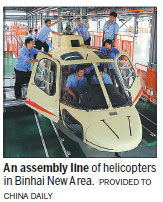
Streamlined civil service system lures new business
In the National Museum of China, there is a glass case which holds the 109 government seals previously needed for various certifications of civil affairs in Binhai New Area, Tianjin. Today, just one seal is needed in place of those 109.
In 2014, the area became a pioneer in simplifying the administrative approval system and optimizing government services.
As one of the 12 National Synthetic Reform Testing Districts - the areas which are piloting the new administrative approval system - Binhai has tried to shake off redundancy in government processes to help fuel economic development and improve social governance.
The streamlined system has made it more attractive for businesses to operate in places such as Binhai-Zhongguancun Science Park, where from January to September, a total of 415 companies settled.
Tianjin Lishen Battery Joint-Stock, a lithium battery producer, has operated in Binhai for 20 years. At first, it had just two rooms and seven employees. Today it provides lithium batteries for some of the world's biggest companies including Apple, Samsung and LG.
"Many achievements have been made after the reform. It gives companies better chances to do business and we have benefited from the policy," said Qin Xingcai, chairman of the company, to People's Daily.
Revenue of the Tianjin branch of Sew Eurodrive, a Germany-invested company which manufactures gearboxes, has increased from 30 million yuan ($4.3 million) to 6.5 billion yuan after operating in the area for some 20 years.
Zhang Shengli, general manager of Sew China, told Economic Daily that the area has an ideal investment environment, government support and plentiful resources for machinery manufacturing.
To compare the area to a car, the administrative system is the engine, said Yang Maorong, district governor of Binhai New Area. "Only if we insist on comprehensively deepening the reform and innovation of the system, can the engine become more powerful."
"It only takes eight minutes to get the electronic business license," an executive from Tianjin Dongjiang Youmeijia Housekeeping Management told Guangming Daily.
Paperless registrations have also gained popularity among local technological, internet, sharing companies and entrepreneurs.
Due to its optimized business environment, the area has attracted nearly 400 projects by Fortune Global 500 enterprises and the annual inflow of foreign investment has surpassed $10 billion.
Binhai New Area's preferential policies are not just aimed at businesses but talents as well. Graduates with bachelor's degree or above can apply for a hukou - the register of permanent residence. The government has also allocated total funds of up to 1 billion yuan to promote innovation and entrepreneurship.


